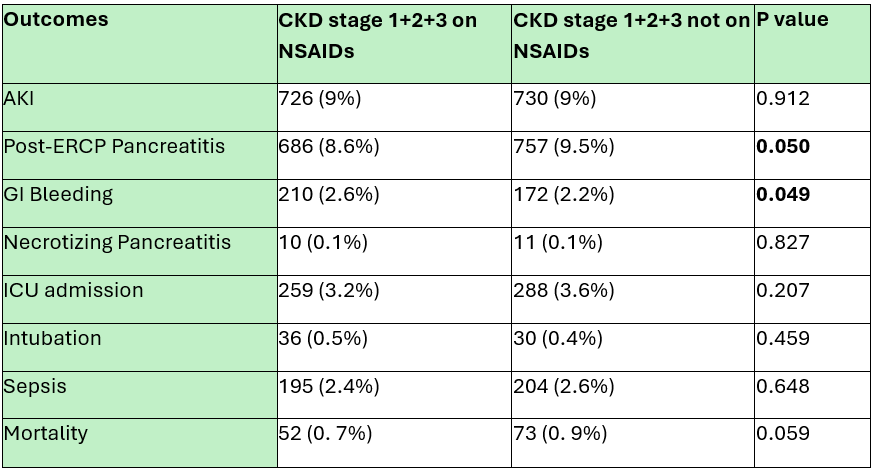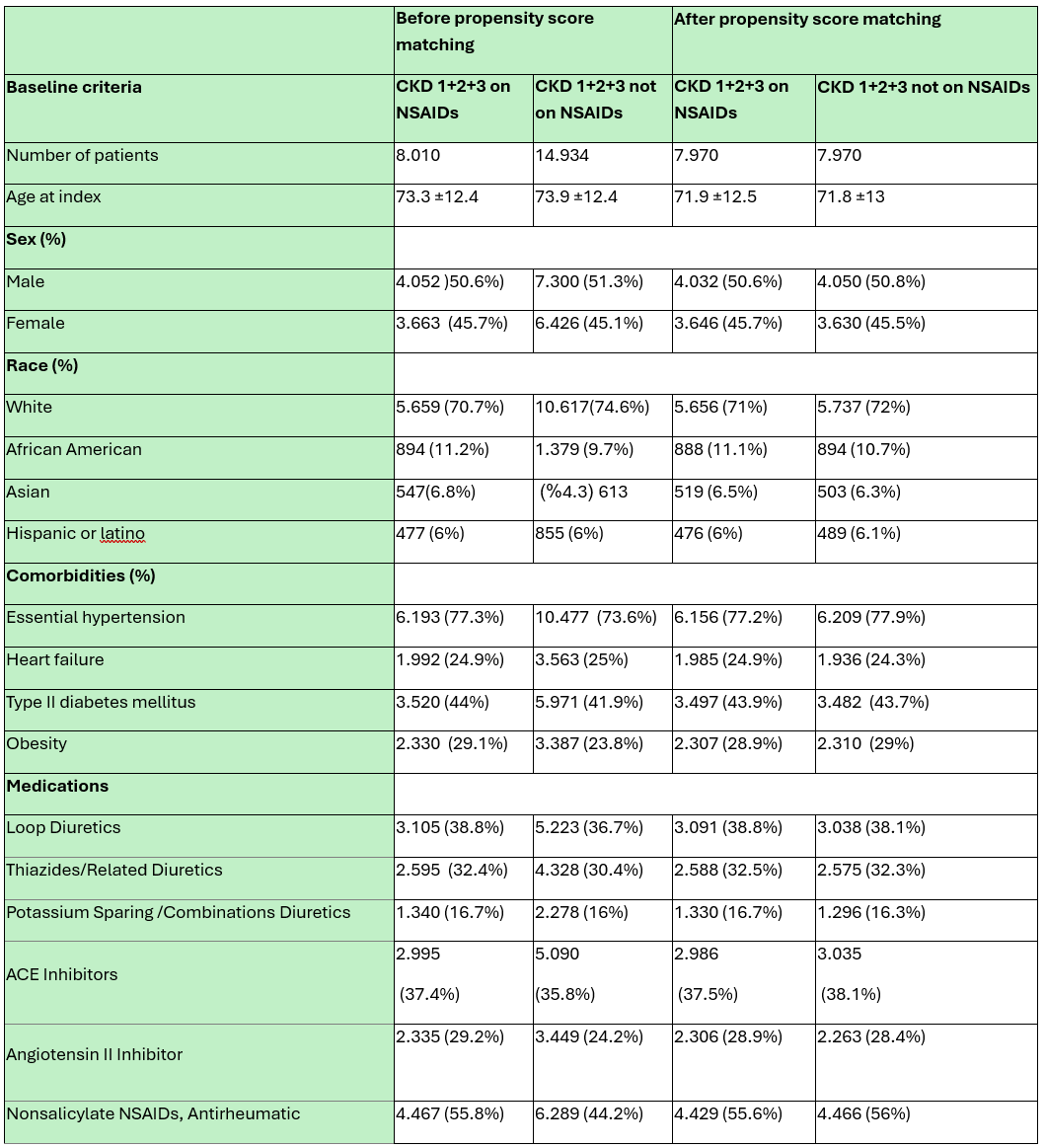Oral Paper Presentation
Annual Scientific Meeting
Session: Plenary Session 2B: Liver / Biliary / Pancreas / Endoscopy
36 - The Use of Rectal Non-Steroidal Anti-Inflammatory Drugs (NSAIDs) Is Safe and Effective in Patients with Early-Stage CKD Undergoing ERCP: A Comparative Matched Analysis of Real-World Data
Tuesday, October 28, 2025
9:50 AM - 10:00 AM PDT
Location: North Ballroom 120BC
- MA
Mohammed Abusuliman, MD
Henry Ford Hospital
Dearborn, MI
Presenting Author(s)
Mohammed Abusuliman, MD1, Azizullah Beran, MD2, Amr Abusuliman, MD3, Khaled Elfert, MBChB, MRCP4, Mohamed Eldesouki, MD5, Hazem Abosheaishaa, MD6, Ahmed Salem, MD7, Mona A. Ali, MD8, Mohammed Y. Youssef, MD9, Mark Gromski, MD2, Sherif E. Elhanafi, MD10
1Henry Ford Hospital, Detroit, MI; 2Indiana University School of Medicine, Indianapolis, IN; 3Tanta University, Qutour, Al Gharbiyah, Egypt; 4West Virginia University School of Medicine, Morgantown, WV; 5Saint Michael's Medical Center, New York Medical College, Newark, NJ; 6Mount Sinai West, Icahn School of Medicine at Mount Sinai, Queens, NY; 7Maimonides Medical Center, Brooklyn, NY; 8Mansoura University, Mansoura, Ad Daqahliyah, Egypt; 9Hunt Regional Medical Center, Greenville, TX; 10Texas Tech University Health Sciences Center, El Paso, TX
Introduction: Post-endoscopic retrograde cholangiopancreatography (ERCP) pancreatitis (PEP) is a common and serious complication of ERCP. Rectal nonsteroidal anti-inflammatory drugs (NSAIDs) like indomethacin and diclofenac are widely used for prevention due to their anti-inflammatory effects. However, in patients with early-stage chronic kidney disease (CKD), these drugs may increase the risk of acute kidney injury (AKI). We aimed to assess renal safety by measuring the incidence of AKI following NSAIDs use and the prophylactic benefit against PEP in early-stage CKD patients.
Methods: Through the TriNetX US Collaborative Network, we identified patients with early-stage CKD (stage 1, 2, 3a and 3b) who underwent ERCP and received prophylactic rectal indomethacin or diclofenac and compared them to a matched control group of CKD patients who did not receive prophylaxis. The primary outcome was the development of AKI following ERCP. Secondary outcomes included post-ERCP pancreatitis (PEP), gastrointestinal bleeding (GIB), ICU admission, acute necrotizing pancreatitis (ANP), sepsis, intubation, and overall mortality. We matched the groups based on baseline characteristics, co-morbidities, and pertinent medications that increase the risk of kidney injury like diuretics, ACE or ARBs to eliminate hidden confounders.
Results: Before matching, a total of 8,010 patients with CKD stages 1, 2, 3a and 3b who underwent ERCP and received rectal NSAIDs and 14,934 who did not receive NSAIDs were identified. After propensity score matching, each group included 7,970 patients with similar baseline characteristics. The mean age was approximately 72 years in both groups, with balanced sex and racial distribution (Table 1).
There was no difference in the incidence of acute kidney injury (AKI) between groups (9% in both groups, p = 0.912). PEP occurred slightly less in the NSAID group (8.6% vs. 9.5%, p = 0.050), while GIB was marginally more frequent among NSAID group (2.6% vs. 2.2%, p = 0.049). No significant differences were observed in ANP (0.1% in both), ICU admission (3.2% vs. 3.6%, p = 0.207), intubation (0.5% vs. 0.4%, p = 0.459), sepsis (2.4% vs. 2.6%, p = 0.648), or mortality (0.7% vs. 0.9%, p = 0.059). (Table 2)
Discussion: In patients with early-stage CKD undergoing ERCP, prophylactic rectal NSAIDs use was not associated with increased risk of AKI, with decreased incidence of PEP. This overall safety profile suggests NSAIDs may be used cautiously in this population with proper clinical oversight.

Figure: Table 1: baseline characteristics, co-morbidities, and pertinent medications before and after propensity score matching

Figure: Table 2: outcomes
Disclosures:
Mohammed Abusuliman indicated no relevant financial relationships.
Azizullah Beran indicated no relevant financial relationships.
Amr Abusuliman indicated no relevant financial relationships.
Khaled Elfert indicated no relevant financial relationships.
Mohamed Eldesouki indicated no relevant financial relationships.
Hazem Abosheaishaa indicated no relevant financial relationships.
Ahmed Salem indicated no relevant financial relationships.
Mona Ali indicated no relevant financial relationships.
Mohammed Y. Youssef indicated no relevant financial relationships.
Mark Gromski: Grant/Research/Clinical Trial Support – Allurion; Cook Medical; Fractyl. Consultant/Advisory Boards – Ambu; Boston Scientific; Cook Medical – Advisory Committee/Board Member, Grant/Research Support.
Sherif Elhanafi indicated no relevant financial relationships.
Mohammed Abusuliman, MD1, Azizullah Beran, MD2, Amr Abusuliman, MD3, Khaled Elfert, MBChB, MRCP4, Mohamed Eldesouki, MD5, Hazem Abosheaishaa, MD6, Ahmed Salem, MD7, Mona A. Ali, MD8, Mohammed Y. Youssef, MD9, Mark Gromski, MD2, Sherif E. Elhanafi, MD10, 36, The Use of Rectal Non-Steroidal Anti-Inflammatory Drugs (NSAIDs) Is Safe and Effective in Patients with Early-Stage CKD Undergoing ERCP: A Comparative Matched Analysis of Real-World Data, ACG 2025 Annual Scientific Meeting Abstracts. Phoenix, AZ: American College of Gastroenterology.
1Henry Ford Hospital, Detroit, MI; 2Indiana University School of Medicine, Indianapolis, IN; 3Tanta University, Qutour, Al Gharbiyah, Egypt; 4West Virginia University School of Medicine, Morgantown, WV; 5Saint Michael's Medical Center, New York Medical College, Newark, NJ; 6Mount Sinai West, Icahn School of Medicine at Mount Sinai, Queens, NY; 7Maimonides Medical Center, Brooklyn, NY; 8Mansoura University, Mansoura, Ad Daqahliyah, Egypt; 9Hunt Regional Medical Center, Greenville, TX; 10Texas Tech University Health Sciences Center, El Paso, TX
Introduction: Post-endoscopic retrograde cholangiopancreatography (ERCP) pancreatitis (PEP) is a common and serious complication of ERCP. Rectal nonsteroidal anti-inflammatory drugs (NSAIDs) like indomethacin and diclofenac are widely used for prevention due to their anti-inflammatory effects. However, in patients with early-stage chronic kidney disease (CKD), these drugs may increase the risk of acute kidney injury (AKI). We aimed to assess renal safety by measuring the incidence of AKI following NSAIDs use and the prophylactic benefit against PEP in early-stage CKD patients.
Methods: Through the TriNetX US Collaborative Network, we identified patients with early-stage CKD (stage 1, 2, 3a and 3b) who underwent ERCP and received prophylactic rectal indomethacin or diclofenac and compared them to a matched control group of CKD patients who did not receive prophylaxis. The primary outcome was the development of AKI following ERCP. Secondary outcomes included post-ERCP pancreatitis (PEP), gastrointestinal bleeding (GIB), ICU admission, acute necrotizing pancreatitis (ANP), sepsis, intubation, and overall mortality. We matched the groups based on baseline characteristics, co-morbidities, and pertinent medications that increase the risk of kidney injury like diuretics, ACE or ARBs to eliminate hidden confounders.
Results: Before matching, a total of 8,010 patients with CKD stages 1, 2, 3a and 3b who underwent ERCP and received rectal NSAIDs and 14,934 who did not receive NSAIDs were identified. After propensity score matching, each group included 7,970 patients with similar baseline characteristics. The mean age was approximately 72 years in both groups, with balanced sex and racial distribution (Table 1).
There was no difference in the incidence of acute kidney injury (AKI) between groups (9% in both groups, p = 0.912). PEP occurred slightly less in the NSAID group (8.6% vs. 9.5%, p = 0.050), while GIB was marginally more frequent among NSAID group (2.6% vs. 2.2%, p = 0.049). No significant differences were observed in ANP (0.1% in both), ICU admission (3.2% vs. 3.6%, p = 0.207), intubation (0.5% vs. 0.4%, p = 0.459), sepsis (2.4% vs. 2.6%, p = 0.648), or mortality (0.7% vs. 0.9%, p = 0.059). (Table 2)
Discussion: In patients with early-stage CKD undergoing ERCP, prophylactic rectal NSAIDs use was not associated with increased risk of AKI, with decreased incidence of PEP. This overall safety profile suggests NSAIDs may be used cautiously in this population with proper clinical oversight.

Figure: Table 1: baseline characteristics, co-morbidities, and pertinent medications before and after propensity score matching

Figure: Table 2: outcomes
Disclosures:
Mohammed Abusuliman indicated no relevant financial relationships.
Azizullah Beran indicated no relevant financial relationships.
Amr Abusuliman indicated no relevant financial relationships.
Khaled Elfert indicated no relevant financial relationships.
Mohamed Eldesouki indicated no relevant financial relationships.
Hazem Abosheaishaa indicated no relevant financial relationships.
Ahmed Salem indicated no relevant financial relationships.
Mona Ali indicated no relevant financial relationships.
Mohammed Y. Youssef indicated no relevant financial relationships.
Mark Gromski: Grant/Research/Clinical Trial Support – Allurion; Cook Medical; Fractyl. Consultant/Advisory Boards – Ambu; Boston Scientific; Cook Medical – Advisory Committee/Board Member, Grant/Research Support.
Sherif Elhanafi indicated no relevant financial relationships.
Mohammed Abusuliman, MD1, Azizullah Beran, MD2, Amr Abusuliman, MD3, Khaled Elfert, MBChB, MRCP4, Mohamed Eldesouki, MD5, Hazem Abosheaishaa, MD6, Ahmed Salem, MD7, Mona A. Ali, MD8, Mohammed Y. Youssef, MD9, Mark Gromski, MD2, Sherif E. Elhanafi, MD10, 36, The Use of Rectal Non-Steroidal Anti-Inflammatory Drugs (NSAIDs) Is Safe and Effective in Patients with Early-Stage CKD Undergoing ERCP: A Comparative Matched Analysis of Real-World Data, ACG 2025 Annual Scientific Meeting Abstracts. Phoenix, AZ: American College of Gastroenterology.

